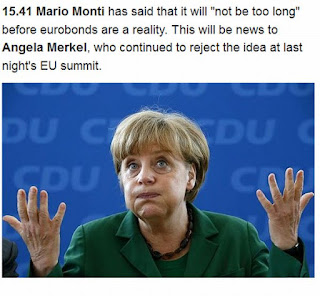Euron kollapsar i Spanien
As I wrote in my column this morning, the Spanish economy is spiralling into debt-deflation. Monetary and fiscal policy are both excruciatingly tight for a country in this condition. The plan to slash the budget deficit from 8.9pc to 5.3pc this year in the middle of an accelerating contraction borders on lunacy. You cannot do this to a society where unemployment is already running at 24.4pc. Either Europe puts a stop to this very quickly by mobilising the ECB to take all risk of a Spanish (or Italian) sovereign default off the table – and this requires fiscal union to back it up – or it must expect Spanish patriots to take matters into their own hands and start to restore national self-control outside EMU. Just to be clear to new readers, I am not "calling for" a German bail-out of Spain or any such thing. My view has always been that EMU is a dysfunctional and destructive misadventure – for reasons that have been well-rehearsed for 20 years on these pages.



